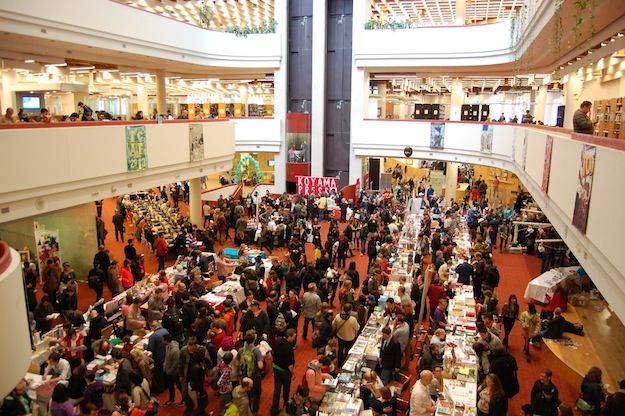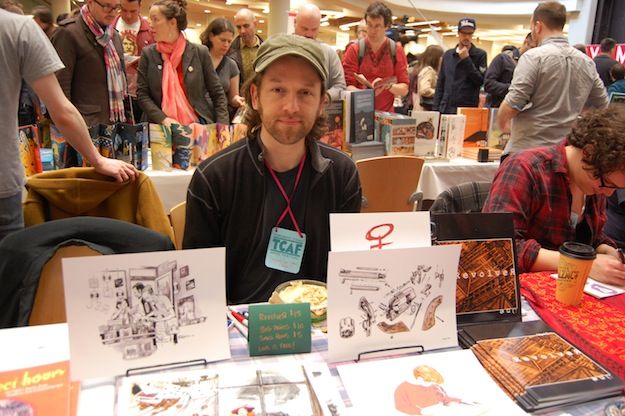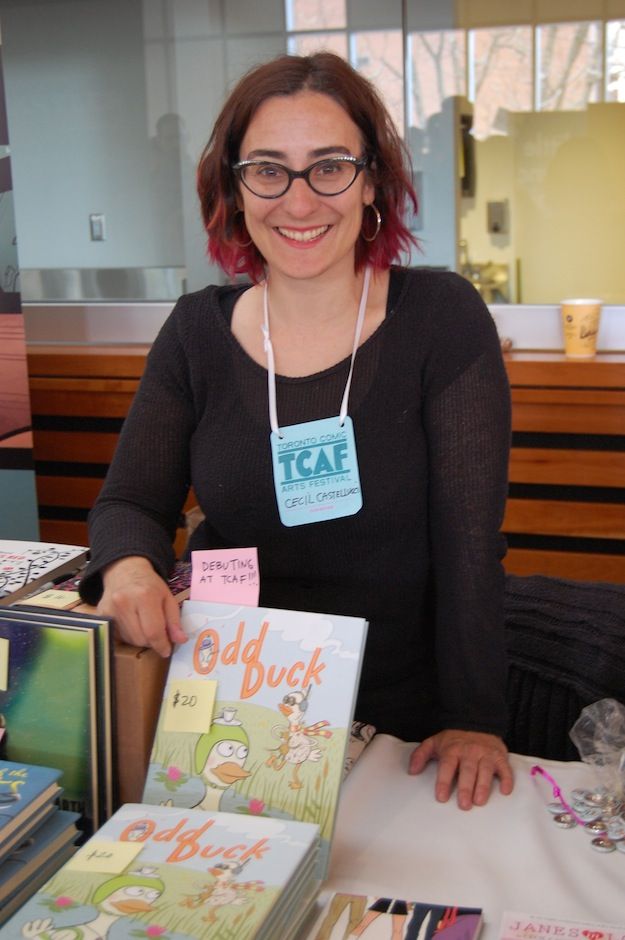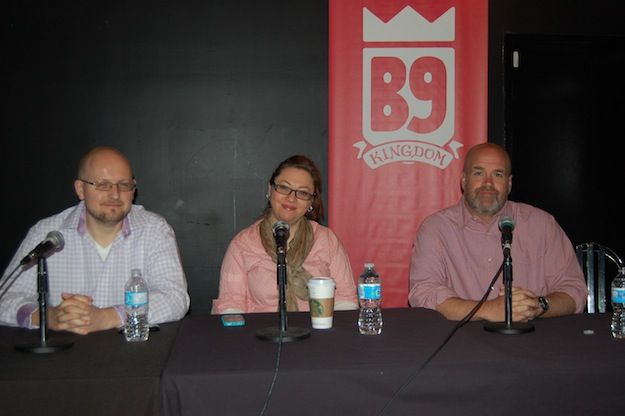People have been saying for years that TCAF is the best comics event of the year, and although this was my first TCAF, I have to say that they weren't exaggerating.
The reason is simple: TCAF focuses on the comics, nothing else. It is unmarred by superhero-themed cars, screeching videogame sound effects, or giant banners promoting this summer's movies. What's more, it's not at all corporate. The big publishers are entirely absent, because this show is about creator-owned indie comics. Everyone is doing their own thing, not working for The Man (or The Licensor, as the case may be). It's a show for enthusiasts.
That's not to say there aren't big names. In fact, the guest list reads like a Who's Who of independent comics creators. A quick sample: Art Spiegelman, Seth, Gilbert and Jaime Hernandez, Taiyo Matsumoto, Ruto Modan, Bryan Lee O'Malley, Hope Larson, Faith Erin Hicks, and Michel Rabagliati, whom I had the pleasure of interviewing for a panel and who won the Doug Wright Award on Saturday evening for his Song of Roland.
If you saw any of these people at Comic-Con, it would probably be from a distance, in the audience at a panel or standing in line at a signing. At TCAF, while there were crowds, most of the creators were very accessible; there were a variety of events, and anyway, almost everyone stays in the same hotel, which is also where some of the panels are held, so you all end up walking the same corridors and taking the same elevators.
The great thing about TCAF, though, is not going through the same revolving door as Art Spiegelman, it's seeing the wide span of the comics universe, from hand-stapled mini-comics to gold-stamped hardcovers, from the fringes of art-comix to straightforward adventure stories, from kid stuff to erotica.
My colleague Heidi MacDonald has written the go-to piece on this year's TCAF, and Jamie Coville has assembled audio of a number of panels, as well as a huge array of photos, for those who want a more immediate experience. I can't possibly top either of them, but here are a few of my own impressions.
The first thing I learned, even before I left Boston, is that I was doing it wrong. I planned on arriving in Toronto on Friday evening, which means I missed a panoply of events before the show proper, including exhibits, parties, and the librarian/teacher day. Next year I'll be allotting plenty of time. (I also won't be driving there solo from Boston. Lesson learned!)
Nonetheless, I arrived in time to go to the Chromatic Press party, where I got to sit with some true manga professionals—Lillian Diaz-Przybyl, Hope Donovan, and Lianne Sentar, among others—who are busy reinventing manga publishing for the next generation. As my friend (and roommate for the weekend) Erica Friedman said, "These are women who are truly 'leaning in.'" While there was plenty of excitement about their new books, including bringing back Off*Beat, it was also fun to listen to the battle stories of the early days of manga publishing.
Of course, one of the pleasures of any comics event is encountering people in person that you have been corresponding with from across the internet. I was delighted to meet Salgood Sam, who was there with the first issue of his quarterly comic Revolver. Sam lives in Montreal, and we had a fascinating conversation about the politics of language and why I can't understand Canadian French, despite having lived in France for years. And it was great to meet nemu-nemu co-creator Audra Furuichi, who came out from Hawaii for the event.
At shows like this, we bloggers always ask each other what the standout book of the show is. I walked in thinking it was Rutu Modan's The Property, but I had my mind blown by Michel Rabagliati's Paul Joins the Scouts. Other debuts included Art Spiegelman's CO-MIX, Matt Kindt's Red-Handed, Gilbert Hernandez's Marble Season, and Taiyo Matsumoto's Sunny. It's going to be a good year for graphic novels, I can already tell, and a tough year to be an Eisner judge.
Children's comics were well represented with their own space upstairs in the Artists Alley area, sponsored by the Canadian kids' magazine OWL Kids. Again, the roster was impeccable: Francoise Mouly's Toon Books were well represented, along with Dave Roman, Raina Telgemeier, Eric Wight, Frank Cammuso, Faith Erin Hicks, and a host of others. To walk through that room, going from table to table, is to realize how far children's comics have come.
On Sunday morning I moderated a panel with the provocative title "Is Comics Blogging Dead?" I think the consensus was that no, it isn't, but it's tough to make any money at it. There is plenty of room for good writing, though, and some niches are not yet filled; Spurgeon mentioned that he would like to see more manga reporting and someone focusing on mini-comics.
I wish I had time to do that blog, because to me the mini-comics are the best part of every show—these are the comics you can't get anywhere else, and if you choose wisely, you will get bragging rights. I have the mini-comic that grew into Raina Telgemeier's Smile, for instance, and an early copy of The Potter's Pet, by Braden Lamb and Shelli Paroline, now known as the Adventure Time artists. (I actually borrowed that from my friend Robin Brenner, so I was happy to get my own copy at TCAF.) My haul this time included some lovely risograph comics from the Sacred Prism series edited by Ian Harker; a back issue of The Cartoon Picayune, a journalism mini-comic edited by Josh Kramer; and Jonathan Baylis's So Buttons Five.
Finally, from a personal point of view, the best thing about TCAF was that I was too busy before the show to line up any writing gigs, so I got to enjoy it purely as a fan. That's a luxury I don't have at the bigger shows, but ultimately, it's why it's important to get out from behind the computer. Hanging out with the other bloggers over dinner or a bag of caramelcorn; meeting creators I only see once or twice a year; having Jim Zub explain Japanese pub food to me at Guu; and making the acquaintance of the charming and talented Michel Rabagliati—these are the moments I will remember in the coming year, every time someone says "So how was TCAF?"
And next year, I'll be back.





